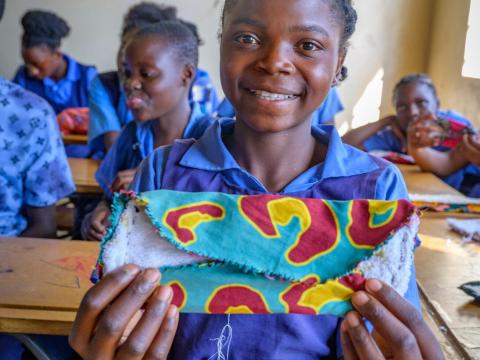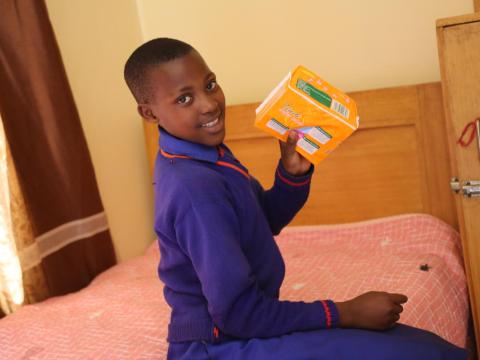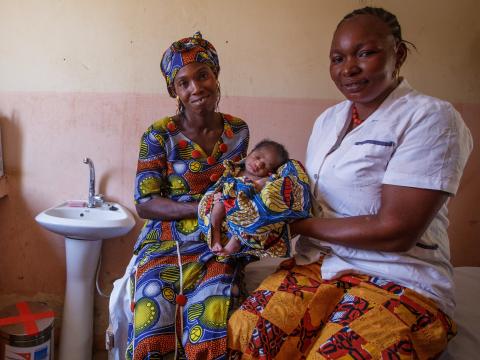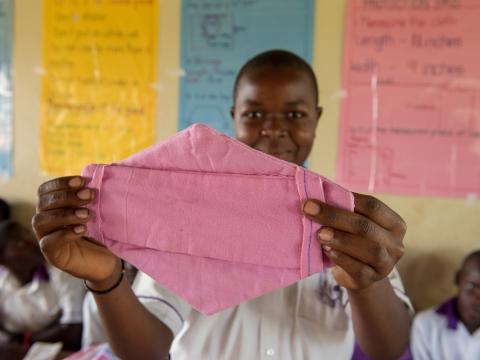
Helping girls reach their potential through dignified menstruation
For Menstrual Hygiene Day, Idalina Roia Alfai reflects on the vital work that needs to be replicated around the world to ensure girls have every opportunity to flourish.
27 May, 2023
Growing up in Mozambique, all the knowledge and information I had about menstruation came from school and friends. Menstruation in my family was treated as taboo, something you could not talk about. There was also the issue of access to menstrual period-friendly infrastructure.
As a teenager, I lived in a small town and the toilets in my school did not offer adequate conditions: they were dirty, lacked water, and had faeces all over the place which prevented us from entering. Students had to go to the bush and trees behind the school to relieve their physiological needs. Those of us who lived close to the school might go home during the breaks to relieve ourselves and take care of our hygiene. Sometimes, we were unable to make it back to school in time, and we had to stand outside the classroom, missing the chance to actively participate in class and fully understand the subject.
Just like me, or worse than me, in rural areas many girls miss school days and have low school performance due to menstruation. They are often forced to stay at home on days when they are menstruating because schools do not provide adequate infrastructure to take care of themselves and they do not have access to proper menstrual hygiene products.
For many girls, the choice is between missing class and falling behind or staining your school uniform with blood and being teased and/or bullied by others.
Tomorrow, May 28th, the world celebrates Menstrual Hygiene Day to raise awareness about the importance of menstrual health and hygiene and to remind all of us that we have a role to play "to build a world where no one is held back because they menstruate".
More than 1.8 billion people across the world menstruate each month, but around 500 million menstruating women and girls still lack access to menstrual hygiene products as well as adequate menstrual health infrastructure. This lack of basic conditions for menstrual health contributes to the fact that many women and girls continue to be excluded, especially from the opportunity to have an education, earn an income, and participate fully and equally in daily life and education due to menstruation, which exacerbates gender inequalities and extreme poverty.
Through the implementation of an integrated water, sanitation and hygiene (WASH) programme in schools, in the Southern Africa Region World Vision is contributing significantly to improving not only girls' understanding of menstruation, but also providing menstruation-friendly infrastructure in schools. The school-based WASH UP! Girl Talk programme, designed in partnership with Sesame Workshop, works to increase knowledge, healthy behaviours, teacher support, and trusting peer relationships among students. The program has reached more than 57,000 students in Zimbabwe alone, and we are currently expanding WASH UP! Girl Talk into four new countries over the next two years: Kenya, Honduras, Guatemala and El Salvador.
At the same time, World Vision is working in partnership with local governments to build appropriate infrastructure in schools to support dignified menstrual hygiene management. For example, in Zambia we are partnering with the Ministry of Education to build ablution blocks, blocks of toilets with compartments for menstrual hygiene management and washing, at rural schools. Ensuring access to water inside the blocks has been a challenge in the past, but we are overcoming this by designing integrated school infrastructure projects that address both water and sanitation access.
Some of the results of these school WASH programmes include:
- Girls (and boys) empowered with essential knowledge and skills. By providing girls with skills and knowledge to feel confident about themselves and their menstruation, they are able to advocate for themselves, seek help when needed, and become leaders in their schools. We are also ensuring that boys have the knowledge and skills they need to understand puberty and support their female peers.
- More supportive schools and communities. By engaging parents and guardians, boys, girls, local and faith-based leadership in open discussions, we are helping to break the taboos and harmful cultural norms and values associated with menstruation and menstrual hygiene management. This leads to more supportive environments for women and girls.
- Girls equipped to manage their menstruation with dignity. By ensuring girls have well-equipped sanitation facilities, reusable pads, and access to information on puberty and menstrual hygiene management, girls can take care of their menstruation in safety and with dignity.
Responding to the menstrual health needs of women and girls is creating a favourable environment for them to develop their potential. As someone who experienced these very challenges herself as a girl, I know how menstruation can prevent girls from thriving. Breaking taboos regarding menstruation, providing information necessary to understand menstruation, and ensuring women and girls have the supplies and infrastructure they need are key. Our girls deserve nothing less.
Learn more about World Vision’s water, sanitation and hygiene (WASH) programmes here.
Read more about the WASH UP! Girl Talk programme here.
Idalina Roia Alfai is the Regional WASH Director for the Southern Africa Region. Prior to her current role, she led the WV Mozambique WASH programme for 9 years. Idalina lives in Maputo with her husband and three children.


